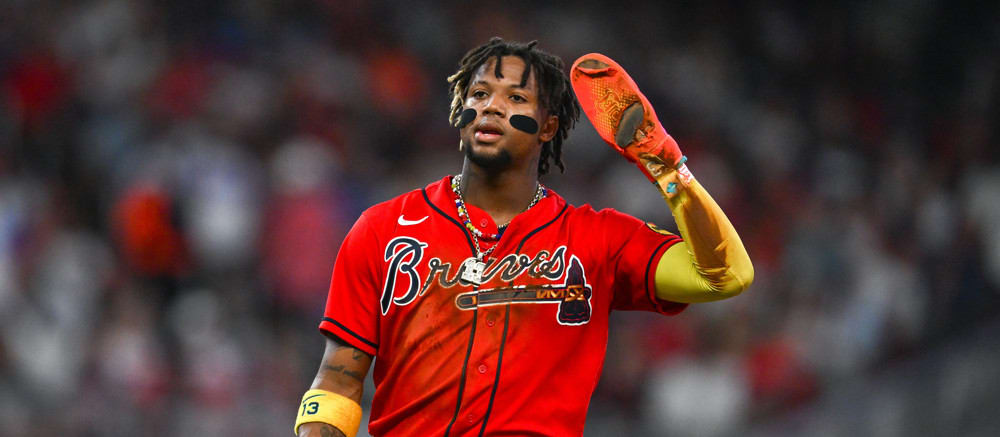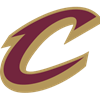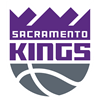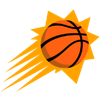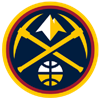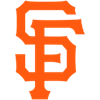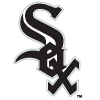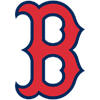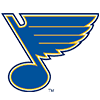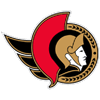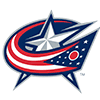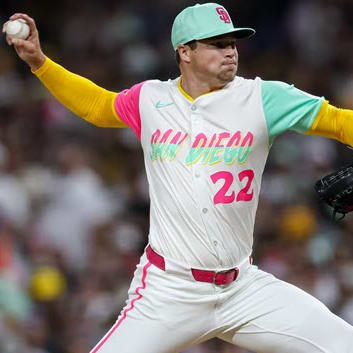Nothing in the fantasy baseball world quite matches the spectacle of a live NFBC Main Event. That's not to say other drafts aren't as important, meaningful or even fun. But there's something special about having eight drafts with 15 teams apiece all drafting concurrently, hearing your sleeper being announced before you're about to take him in another draft around the room, and checking out the boards in another high-stakes event.
For those unfamiliar, the NFBC (National Fantasy Baseball Championship) is a series of medium-to-high stakes season long fantasy baseball leagues, many of which have an overall contest component. The Main Event has a $1,750 entry fee and a $200,000 overall grand prize. Each 15-team league also pays out the top three places. There are various price points and league sizes for their different events. It used to be that you could only draft the Main Event live, either in Las Vegas, New York or Chicago (and at least one year in Florida, if I recall correctly). Now the option to draft the Main Event online also exists, but I still love the live events the most.
There were two major discussion themes over the course of the weekend. One was what do you do with Shohei Ohtani? Do you think that he'll face any discipline from MLB reegarding his interpreter's gambling case? Do you really buy that it was his interpreter that was betting such massive wagers? There are many aspects to the story that merit more
Nothing in the fantasy baseball world quite matches the spectacle of a live NFBC Main Event. That's not to say other drafts aren't as important, meaningful or even fun. But there's something special about having eight drafts with 15 teams apiece all drafting concurrently, hearing your sleeper being announced before you're about to take him in another draft around the room, and checking out the boards in another high-stakes event.
For those unfamiliar, the NFBC (National Fantasy Baseball Championship) is a series of medium-to-high stakes season long fantasy baseball leagues, many of which have an overall contest component. The Main Event has a $1,750 entry fee and a $200,000 overall grand prize. Each 15-team league also pays out the top three places. There are various price points and league sizes for their different events. It used to be that you could only draft the Main Event live, either in Las Vegas, New York or Chicago (and at least one year in Florida, if I recall correctly). Now the option to draft the Main Event online also exists, but I still love the live events the most.
There were two major discussion themes over the course of the weekend. One was what do you do with Shohei Ohtani? Do you think that he'll face any discipline from MLB reegarding his interpreter's gambling case? Do you really buy that it was his interpreter that was betting such massive wagers? There are many aspects to the story that merit more scrutiny, and thus add extra risk to drafting Ohtani early. Frankly, I was on the low-end of Ohtani's rankings before this story broke - he's coming off of Tommy John surgery, his second one no less - we saw last year when Bryce Harper returned that there's a risk that a player's power is slow to return in such situations. Moreover, as a dual-position player, Ohtani is going to be spending some of his time rehabbing his pitching arm over the course of the season. He might not make any minor league rehab outings, but the risk of him needing a day off here and there is heightened nonetheless. I also would prefer not to tie up my UT spot right away, though that's a lesser factor.
The other major discussion point was the risking cost of pitching. There's always a sense of pitching inflation for the Main Event, being an overall contest first and also being a series of drafts that occur later in draft season. Thus the ADP rises after we get our first wave of pitcher injuries. The injuries to Gerrit Cole, Eury Perez, Kodai Senga, Devin Williams, Jhoan Duran and Jordan Romano really altered the pitching environment this year, perhaps more than most. To give you an idea of how much the pitching has gotten more expensive, below is a table comparing ADP's in the NFBC 15-team leagues from 3/1-3/12 and the draft position in my Main Event, using pitchers in the top 100 from that span, plus Robert Suarez because of his meteoric climb and because he was a target that I came nowhere near landing.
Rank = Draft Rank from 3/1 - 3/12
ADP = Average Pick in that span
ME Pick = Pick in my Main Event Draft
| Rank | Player | ADP | Min Pick | Max Pick | ME Pick | Difference |
| 5 | Strider, Spencer | 6.08 | 2 | 13 | 3 | -3.08 |
| 15 | Cole, Gerrit | 15.98 | 9 | 66 | 206 | 190.02 |
| 20 | Burnes, Corbin | 20.98 | 12 | 35 | 11 | -9.98 |
| 24 | Wheeler, Zack | 24.53 | 18 | 43 | 15 | -9.53 |
| 28 | Castillo, Luis | 29.45 | 19 | 39 | 16 | -13.45 |
| 34 | Kirby, George | 34.43 | 25 | 55 | 19 | -15.43 |
| 35 | Lopez, Pablo | 35.23 | 25 | 49 | 21 | -14.23 |
| 36 | Yamamoto, Yoshinobu | 36.53 | 15 | 51 | 35 | -1.53 |
| 38 | Gausman, Kevin | 37.18 | 21 | 55 | 23 | -14.18 |
| 40 | Glasnow, Tyler | 40.40 | 23 | 57 | 29 | -11.40 |
| 41 | Gallen, Zac | 41.60 | 31 | 56 | 48 | 6.40 |
| 45 | Skubal, Tarik | 46.60 | 32 | 60 | 27 | -19.60 |
| 46 | Diaz, Edwin | 47.18 | 31 | 86 | 41 | -6.18 |
| 47 | Hader, Josh | 49.85 | 37 | 74 | 53 | 3.15 |
| 48 | Webb, Logan | 50.23 | 42 | 68 | 38 | -12.23 |
| 49 | Williams, Devin | 51.03 | 32 | 116 | ||
| 51 | Peralta, Freddy | 52.23 | 38 | 75 | 50 | -2.23 |
| 52 | Nola, Aaron | 54.25 | 42 | 77 | 55 | 0.75 |
| 54 | Duran, Jhoan | 55.33 | 32 | 116 | 160 | 104.67 |
| 56 | Valdez, Framber | 56.60 | 40 | 69 | 42 | -14.60 |
| 58 | Clase, Emmanuel | 58.05 | 39 | 89 | 57 | -1.05 |
| 59 | Fried, Max | 58.78 | 44 | 70 | 52 | -6.78 |
| 60 | Doval, Camilo | 60.75 | 46 | 98 | 58 | -2.75 |
| 63 | Gilbert, Logan | 62.78 | 40 | 85 | 47 | -15.78 |
| 64 | Rodriguez, Grayson | 63.68 | 45 | 94 | 51 | -12.68 |
| 65 | Iglesias, Raisel | 64.35 | 50 | 124 | 62 | -2.35 |
| 67 | Miller, Bobby | 67.78 | 54 | 95 | 54 | -13.78 |
| 72 | Romano, Jordan | 74.55 | 61 | 129 | 151 | 76.45 |
| 74 | Snell, Blake | 76.03 | 59 | 94 | 66 | -10.03 |
| 75 | Eflin, Zach | 76.10 | 60 | 95 | 59 | -17.10 |
| 76 | Perez, Eury | 76.20 | 62 | 103 | 371 | 294.80 |
| 78 | Ragans, Cole | 79.88 | 50 | 112 | 64 | -15.88 |
| 79 | Luzardo, Jesus | 80.35 | 66 | 100 | 82 | 1.65 |
| 81 | Diaz, Alexis | 82.35 | 65 | 130 | 69 | -13.35 |
| 83 | Munoz, Andres | 83.80 | 62 | 182 | 67 | -16.80 |
| 86 | Ryan, Joe | 89.03 | 68 | 113 | 65 | -24.03 |
| 88 | Bednar, David | 90.00 | 61 | 170 | 76 | -14.00 |
| 90 | Sewald, Paul | 91.53 | 72 | 176 | 73 | -18.53 |
| 91 | Phillips, Evan | 92.90 | 61 | 183 | 60 | -32.90 |
| 93 | Fairbanks, Pete | 94.30 | 61 | 191 | 79 | -15.30 |
| 94 | Musgrove, Joe | 94.35 | 74 | 134 | 85 | -9.35 |
| 207 | Suarez, Robert | 212.83 | 175 | 339 | 96 | -116.83 |
It's breathtaking seeing how many starting pitchers jumped up by at least 10 spots, the rise of the closers was pretty stark too (I contributed to that rise by jumping Evan Phillips at pick 60). Here are the only healthy fallers in this group:
Zac Gallen, Josh Hader, Aaron Nola and Jesus Luzardo. That's it, that's the list. None of them dropped by more than seven slots, either.
It's with this lens that you should view my draft. The full draft grid is below, followed by comments on my picks. My team is Team 1:
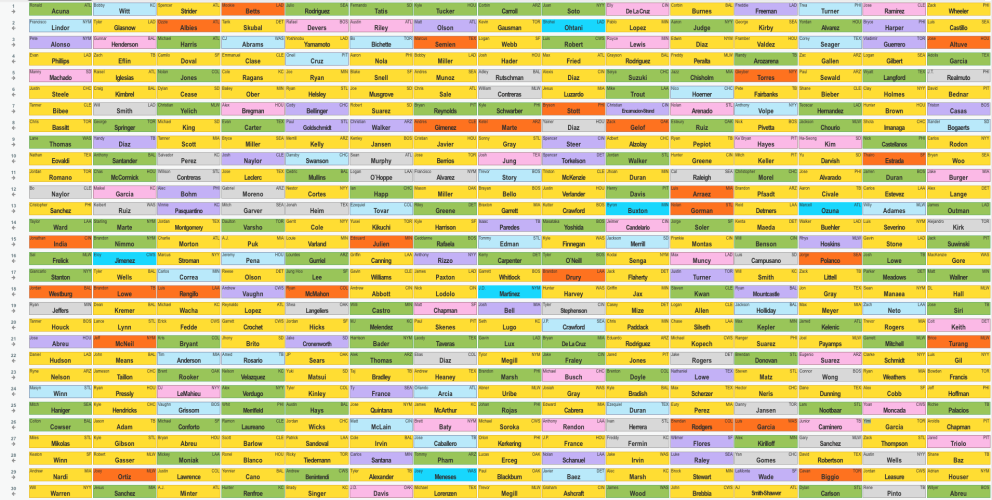
1.1 - Ronald Acuna: As of the time of this writing, Acuña has gone first in all 30 Main Event drafts, though Rob DiPietro took Spencer Strider first in a stand-alone NFBC draft a week ago, and Phil Dussault did the same in the $5,000 Draft Champions League. I gave it consideration too, but at the end of the day I couldn't get past the projected value difference between Acuña and the field, even factoring in some regression and a little concern with the irritation in his knee meniscus earlier this spring.
2.30 - Francisco Lindor / 3.31 - Pete Alonso: The problem with taking Acuña over Strider is the starting pitcher inflation that we discussed above. Nine starting pitchers were taken before my second-round pick. I thought I might have a shot at Kevin Gausman at the turn and had talked myself into taking him, but alas, he was snagged at 2.8! The only ace that came close to falling to me was Tyler Glasnow, who often goes early in the second round. I was unwilling to push Yoshinobu Yamamoto that high, given that I would be unable to keep him active that first week because of his poor start against the Padres in Korea. So instead, I took what the draft gave me in two awesome hitters instead, with the thought that I'd start nabbing starters at the next turn.
4.60 - Evan Phillips / 5.61 - Manny Machado: We veered from the plan, because we thought that there was too much value with Machado compared to all the SP that were available to us. It's a little irresponsible, but we powered through anyhow. Volume! I prioritized Phillips here (with Andres Munoz as the pivot), as closers are equally pushed up as starters. The Korea save made me nervous that I wouldn't get him, but he made it.
6.90 - Justin Steele / 7.91 - Tanner Bibee: There was a tiny concern about Steele after he got hit by a comebacker the other day, but he'll be fine for Opening Day. Other than that, there's not much else to say here. I needed starting pitchers, I really like both of these starters.
8.120 - Chris Bassitt / 9.121 - Lane Thomas: I almost went with two starting pitchers here too, and would have taken Bryce Miller had I done so. Miller went three picks later. I've consistently drafted Lane Thomas this season, and while it's always a risk to take a player after his career year, I think the price paid here accounts for that risk. Moreover, just because I started with Acuña and Lindor doesn't mean I can ignore stolen base sources later in the draft, especially when those sources can still hit.
10.150 - Nathan Eovaldi / 11.151 - Jordan Romano: Eovaldi was a little bit of a reach, but again, I'm on the end would have to wait 28 more picks until my next set of picks, and he stood out over other alternatives. As for Romano, pick 151 seemed like a good spot to take the chance that the elbow inflammation that sidelined him will clear up - he's already throwing on the side. And my favorite CL2 targets had already been snagged - see my comment about Robert Suarez going at pick 96 above.
12.180 - Bo Naylor / 13.181 - Christopher Sanchez: I'm comfortable with many of the catchers in the player pool this year, but there comes a point where I don't want to get stuck without my first one. This was that point - I wanted one of Naylor, Logan O'Hoppe (taken), Gabriel Moreno (taken), Mitch Garver or Jonah Heim here. We almost went with two catchers, but given our late pitcher start, it made more sense to go with our seventh pitcher in Sanchez. Sanchez had a sterling 20.2 K%-BB% last year, and as more attention to his ability was given during his draft season, his ADP has risen accordingly.
14.210 - Taylor Ward / 15.211 - Jonathan India: Ward was starting to overcome a slow start to the season when it instead abruptly ended following a beaning that resulted in multiple facial fractures. I think he's a classic "Last Year's Bum" and a bargain at this price. India is one of the playing time beneficiaries of the Reds horrible, awful, no-good spring - between injuries to Matt McLain and T.J. Friedl, and Noelvi Marte's suspension, the Reds' surplus of hitters just got eviscerated. He not only will likely play every day, but he'll also hit high in the lineup in a great hitting environment at home.
16.240 - Sal Frelick / 17.241 - Giancarlo Stanton: We think Frelick is going to run a ton, and he'll quickly qualify for third-base eligibility. Stanton physically looks great and just hit three homers in a spring training game - it's difficult to resist that sort of power potential this late in the draft. Of course, that also comes with a pitching opportunity cost.
18.270 - Jordan Westburg / 19.271 - Ryan Jeffers: Westburg won a job battle in a great Orioles lineup and qualifies at both 2B/3B. We also thought we timed the C2 market well with Jeffers, who was fifth among catchers in average exit velocity last season.
20.300 - Tanner Houck / 21.301 - Jose Abreu: Houck just won a rotation slot with the Red Sox now that Lucas Giolito is out for the season. He'll probably have to be spotted for me, but I'm hoping that he can improve against lefties with a full season of health (last year he was returning from back surgery) and increase his strikeout rate. Jose Abreu is old and boring, but he's in the middle of a great lineup. Sometimes old-and-boring is just what you need.
22.330 - Daniel Hudson / 23.331 - Ryne Nelson: How much is a single win worth? Last year one needed 91 wins to reach the 80th percentile, and 87 for the 70th percentile. That means you need to average 3.5 wins per week, and that first week of the season only consists of four days. So while it may be cheesy to use the NFBC's "free look" rule at the Korea games and steal a win, it makes too much sense not to. It's only a question of what price to pay. Meanwhile, I've only recently jumped on the Ryne Nelson bandwagon, but it's nice to see what he's done this spring.
24.360 - Masyn Winn / 25.361 - Mitch Haniger: Every year Scott Jenstad, Vlad Sedler, Tim Schuler and I drive together to Vegas for the NFBC, and one exercise we've taken to is to identify hitters and pitchers with post-300 ADP's worth targeting. Winn's defense should buy him time to work through some struggles at the plate and allow him to exercise his speed potential. Haniger appears healthy now, and with health he has the skills to return a profit.
26.390 - Colton Cowser / 27.391 - Miles Mikolas: Cowser was a luxury pick, as I probably didn't need another outfielder, but I love his skills. Mikolas is a carbon-based form of life who will throw a lot of innings for a presumably good team, albeit at a low strikeout-rate.
28.420 - Keaton Winn / 29.421 - Andrew Nardi: Combined with Masyn Winn and Daniel Hudson, we now have a Winn-Winn (win!) situation. Nardi is a speculative play against Tanner Scott and his horrible spring and historically poor walk rate, though there's a chance that Sixto Sanchez would assume the closer role instead of the Nard-dog should Scott give up the role.
30.450 - Will Warren: Warren lost the job battle to Luis Gil and got sent down today, so he'll be our first cut. But we took him on the plausible upside over other pitchers in the mix.
Our overall roster by position:
C - Bo Naylor, Ryan Jeffers
1B/3B/CR - Pete Alonso, Manny Machado, Jose Abreu
2B/SS/MI - Jonathan India, Francisco Lindor, Jordan Westburg
OF - Ronald Acuña Jr., Lane Thomas, Taylor Ward, Sal Frelick, Giancarlo Stanton
UT/Res - Mitch Haniger, Masyn Winn, Colton Cowser
SP - Justin Steele, Tanner Bibee, Chris Bassitt, Nathan Eovaldi, Christopher Sanchez, Tanner Houck, Ryne Nelson, Miles Mikolas, Keaton Winn, Will Warren (FA to be named later)
RP - Evan Phillips, Jordan Romano, Daniel Hudson, Andrew Nardi
We're obviously lighter than we'd like to be on strikeouts and will have to have some breaks go in our direction, but the hitting is fire and we're well-positioned to do well in saves.


